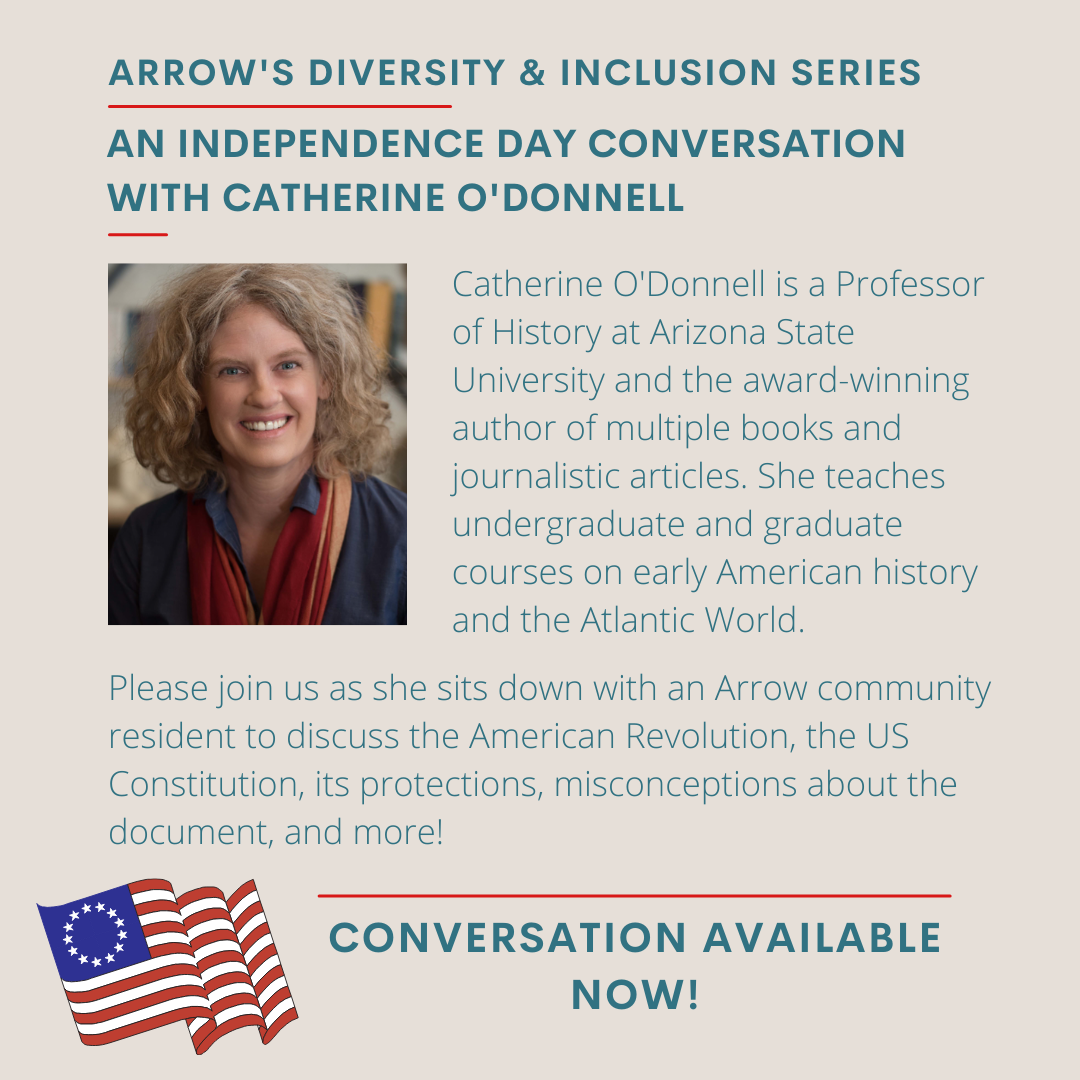
July 3, 2023
Arrow community resident Tony Stephenson sat down with Catherine O’Donnell, Professor of History at Arizona State University, for a conversation on the Constitution and American Revolution.
O’Donnell began the discussion by clarifying what we are celebrating on the Fourth of July: It’s not the celebration of an achievement but rather of a beginning. After long deliberation, this was the day that names were signed to declare independence from Britain, and this decision was fraught.
It’s hard for people to agree on what to have for dinner, much less something as important as declaring independence, O’Donnell quipped. About 1/3 of the colonists supported independence, 1/3 thought it was a terrible idea and remained Loyalists, and the remainder were undecided and kept their heads down, waiting to see how things played out. “The war itself was a process of winning hearts and minds over to the cause of independence, rather than just a war for independence,” O’Donnell said.
“That polarization sounds familiar,” Stephenson smiled.
Once independence was decided upon, the question remained: Did the colonists want a new King or a new type of government? O’Donnell paraphrased the question as: Was it a war about Home Rule or a war about who should rule at home? Most colonists wanted to remove the colonies from the King, but other colonists wanted to change society in a larger way. Discussions were had about the reallocation of wealth, the right to vote for artisans, and other broader social changes.
One of the tragedies of the Revolution is that the question of whether or not the United States should legalize slavery was debated (it is not the case that no one at the time recognized the hypocrisy of liberty for all while enslaving others), but for a variety of reasons ultimately codified in the Constitution.
Some freed African Americans fought in the War (on both sides). Lord Dunmore offered freedom to enslaved people who would fight for the Loyalists. Many of them perished, but not always on the battlefield. The British did not inoculate them against smallbox, for example, which put them at high risk. Survivors were evacuated after the war, some to Canada, and there are towns in Nova Scotia that were founded by Black Loyalists.
The framers put theories and practice of government together in a succinct document, used to govern a complex, expanding, and changing country. The brevity of the document reflects that the framers understood that everything changes and for something to persist it must be flexible rather than brittle.
To that point, O’Donnell understands the Constitution as a living document for three reasons: The first is that the Constitution is a record of argument as much as it is of agreement. The framers themselves did not hold a single viewpoint of what government should look like. Even when they did agree, they didn’t all have the same reasons. “It’s a record of productive disagreement and should continue to allow for productive disagreement” she says. Secondly, it’s built with an understanding of its own need for amendment. Finally, there are elements of the original Constitution which no one now defends. The codification of slavery, for example.
Stephenson wonders if the Constitution is understood today or if people have lost the desire to look at the documents that give us the freedom that we have. O’Donnell agrees, noting that even when people try to quote the Constitution what often comes out of their mouth is from the Declaration of Independence. It gets caught up in partisan arguments but “the document is a flawed but extraordinary structure of American government in which freedom has been pursued (and not achieved perfectly) for hundreds of years.” As a person in this country, you should understand this document and be able to argue about it.
The American Revolution was a colorful, dramatic period of history with all kinds of heroes and villains and debate. People from all walks of life had roles to play. O’Donnell and Stephenson agree in the importance of continuing to learn about it. It is our history and continues to shape our present.
For the full conversation, click here.
Saint Charles, Missouri-based Arrow Senior Living manages a portfolio of communities that offer varying levels of care, including independent living, assisted living, and memory care. Each and every senior living community supports residents by focusing on dignity, respect, and quality of life. The programs and amenities offered are selected to provide only the highest standard of quality and comfort.
Find an Arrow community near you
Work at Arrow Senior Living